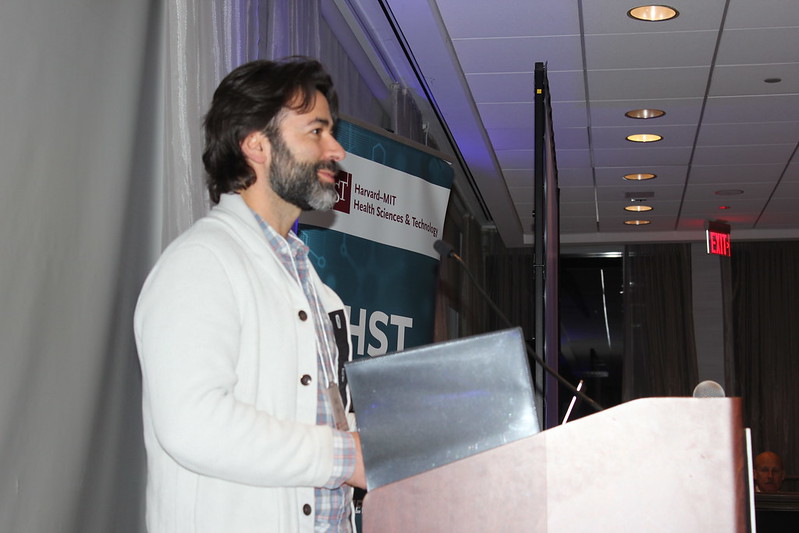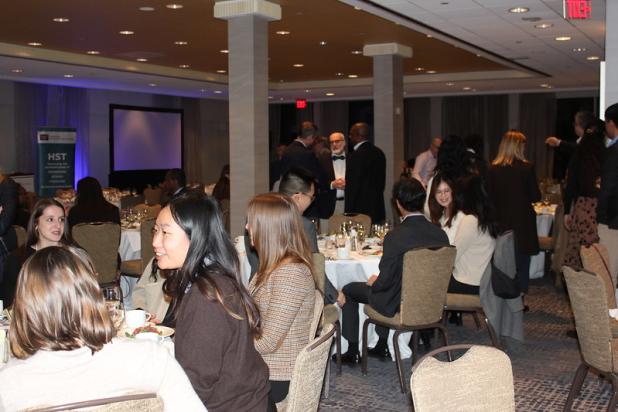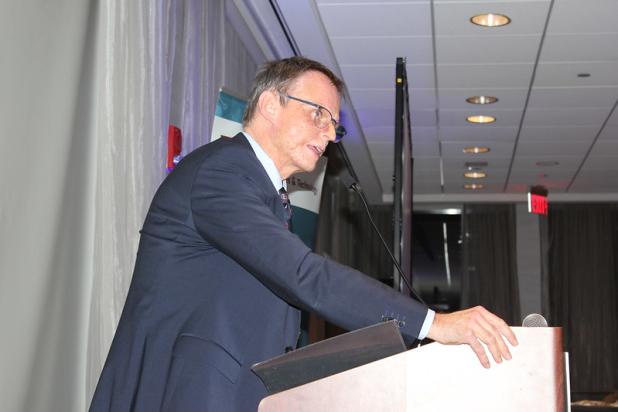
Alex Shalek, recently appointed IMES director, was the guest speaker at the HST Fall Dinner at the Hyatt Regency Hotel.
Mindy Blodgett | HST| IMES
Alex K. Shalek, the J. W. Kieckhefer Professor in the MIT Institute for Medical Engineering and Sciences (IMES) and Department of Chemistry, who was named director of IMES in August, told attendees of the recent HST Fall Dinner that his goal is to “identify and nurture collaboration…fortify our community, and strengthen engagement.”
Shalek, an HST faculty member, succeeded Elazer R. Edelman, HST MD ’83; HST MEMP ’84, who stepped down after leading IMES—HST’s home at MIT—since April 2018. About 155 members of the HST and IMES community attended this year’s dinner, held on Nov. 14, which is sponsored annually by the J.W. Kieckhefer Lecture in Health Sciences and Technology. In addition to his role as IMES director, Shalek holds several leadership positions, including director of the Health Innovation Hub. He is also an extramural member of MIT’s Koch Institute for Integrative Cancer Research; a member of the Ragon Institute of Mass General, MIT, and Harvard; an institute member of the Broad Institute of MIT and Harvard; an assistant in immunology at Mass General Brigham; and an instructor in health sciences and technology at Harvard Medical School.
In addition to discussing his goals as IMES director, Shalek talked about the research of the Shalek Lab, which seeks to uncover how communities of cells work together within human tissues to support health, and how they become dysregulated in disease. In an article in MIT News about Shalek being named to lead IMES, his research was described as “developing and applying innovative experimental and computational technologies, they are shedding light on a wide range of human health conditions.”

Shalek said his lab’s research seeks to “understand balance in tissue…in ecosystems…we develop tools to help bring systems back into balance.”
According to the MIT News article, “Shalek and his team use a cross-disciplinary approach that combines genomics, chemical biology, and nanotechnology to develop platforms to profile and control cells and their interactions. Collaborating with researchers across the globe, they apply these tools to study human diseases in great detail. Their goal is to connect what occurs at a cellular level with what medical professionals observe in patients, paving the way for more precise ways to prevent and treat diseases.”
At the dinner, Shalek discussed how conducting research at MIT engenders unmatched opportunities, because of the “incredible engineers,” and also because of where MIT is located, between other leading institutions, including eminent hospitals.
Pointing out several “systemic challenges,” such as tackling aging, global warming, women’s health, and a “laundry list” of other threats to human health, Shalek said that IMES and HST are well positioned to enable solutions. Yet, still, Shalek said he sees a need to “remove obstacles and barriers” to fortify “this incredible community” so that the important work of addressing human health needs, and of supporting local and global communities, can be brought to the next level.

Wolfram Goessling, HST co-director
The dinner was held at the Hyatt Regency in Cambridge. Shalek was introduced by Wolfram Goessling, the Robert H. Ebert Professor of Medicine, HST, Harvard Medical School, and the co-director of HST at Harvard University. The dinner’s participants were welcomed by Collin M. Stultz, HST MD ’97, the Nina T. and Robert H. Rubin Professor in Medical Engineering and Science, who is the co-director of HST at MIT, and is an associate director of IMES.